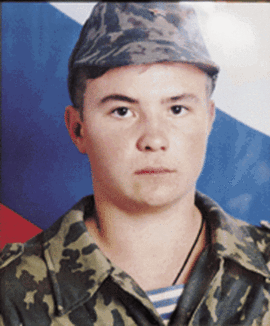- Yevgeny Rodionov
-
Yevgeny Aleksandrovich Rodionov 
Born May 23, 1977
Podolsk, Russian SFSR, Soviet UnionDied May 23, 1996
Chechen Republic, Russian FederationAllegiance  Russia
RussiaYears of service 1995-1996 Rank Private Unit 2631 Border Troops Battles/wars First Chechen War Awards Order of Courage (posthumously) Yevgeny Aleksandrovich Rodionov (Russian: Родионов Евгений Александрович) (May 23, 1977 - May 23, 1996) was a Russian soldier who was taken prisoner and later executed in Chechen captivity. The manner in which he was executed has garnered him much admiration throughout Russia, and even prompted calls for his elevation to sainthood.
Career and capture
Rodionov was born in the village of Satino-Russkoye, near Podolsk, Moscow Oblast. Though he aspired to be a cook, he was conscripted into the Armed Forces of the Russian Federation in 1995. Private Rodionov was deployed to Chechnya, he served in border troops and on February 13, 1996 he was captured by Chechen rebels. They held him captive for more than three months.
On his 19th birthday Rodionov was beheaded on the outskirts of the Chechen village Bamut. According to his killers, who later extorted money from his mother in exchange for knowledge of the location of his corpse, they beheaded him after he refused to renounce his Christian faith or remove the silver cross he wore around his neck.
Veneration
Yevgeny Rodionov was posthumously awarded the Russian Order of Courage. There was a growing movement within the Russian Orthodox Church to canonize him as a Christian saint and martyr for faith. Some Russian soldiers, feeling themselves abandoned by their government, have taken to kneeling in prayer before his image.[1] One such prayer reads:
Thy martyr, Yevgeny, O Lord, in his sufferings hath received an incorruptible crown from Thee, our God, for having Thy strength he hath brought down his torturers, hath defeated the powerless insolence of demons. Through his prayers, save our souls.
As of 2003[update], religious icons depicting Yevgeny had become popular. His mother has one herself; she has suggested that the icon of her son sometimes emits a perfume which she believes to be holy, to the extent that it actually drips with it.[2]
Because of the huge devotion given to the Neo-martyr Yevgeny, the pious faithful sought official canonization from the Moscow Patriarchate. Initially, it refused, which divided the Orthodox in Russia. Maksim Maksimov, Secretary of the Canonization Commission, explained the Synod's position in Tserkovny Vestnik (Church Bulletin), the official publication of the Russian Orthodox Church. His arguments can be summarized in three points:
- The only evidence that the soldier was executed for this faith is the testimony of his mother, who in her love made a god of her son;
- The Russian Orthodox Church has never canonized anyone killed in war;
- The period of new martyrs ended with the collapse of the Bolshevik regime.
However, he emphasized that the deceased can be honoured without canonization. Patriarch Alexy II of Moscow personally blessed the popular account of Yevgeny's life but worried that his cult would balloon into anti-Muslim rage.
Opponents of the decision, including Alexander Shargunov, a well-known priest, argued that an outbreak of people's love is enough for the truth and that Yevgeny's grave works miracles, curing the sick and reconciling enemies. They also point out that the soldier did not die at war but in captivity and that to say that the time of martyrs is over is nearly heresy.
References
- "Boy soldier who died for faith made 'saint'", The Daily Telegraph, January 24, 2004
- "A Drive to Turn a Soldier Into a Saint", The Moscow Times, October 19, 2004
- "From Village Boy to Soldier, Martyr and, Many Say, Saint", The New York Times, November 21, 2003
- "The First Saint of the Chechen War", RIAN, October 5, 2004
- "Russian Soldier Goes Through Chechen Captivity Hell", Pravda Online, January 8, 2003
Categories:- 1977 births
- 1996 deaths
- Russian Orthodox Christians
- People of the Chechen wars
- Russian military personnel
- Folk saints
- Recipients of the Order of Courage
- People from Moscow Oblast
Wikimedia Foundation. 2010.
